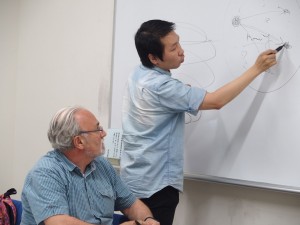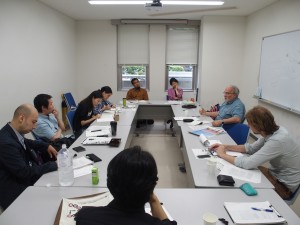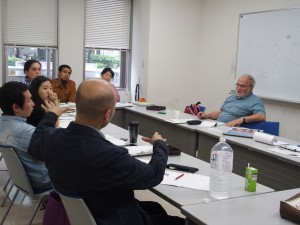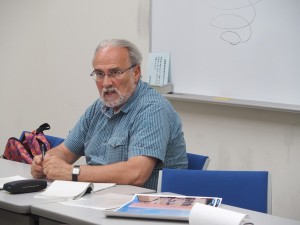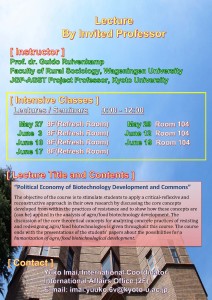AGST Module 1 (Environmental policy & Rural development studies) will hold a series of special lectures titled “Political Economy of Biotechnology Development and Commons” from May 27 to June 19, 2015.
[Instructor]
Dr. Guido Ruivenkamp
Professor, Faculty of Rural Sociology,
Wageningen University & Research Centre (WUR)
Project Professor (JGP), Kyoto University
[Schedule]
(1) May 27, 09:00-12:00
(2) May 29, 09:00-12:00
(3) June 3, 09:00-12:00
(4) June 10, 09:00-12:00
(5) June 12, 09:00-12:00
(6) June 17, 09:00-12:00
(7) June 19, 09:00-12:00
[Venue]
(1), (3), (4), (6): Faculty of Law and Faculty of Economics East Bldg. 8F
(2), (5), (7): Faculty of Law and Faculty of Economics East Bldg. 1F
[Lecture Title]
Political Economy of Biotechnology Development and Commons
[Abstract]
The objective of the course is to stimulate students to apply a critical-reflexive and reconstructive approach in their own research by discussing the core concepts developed from within the practices of resistance and to show how these concepts are (can be) applied in the analysis of agro/food biotechnology development. The discussion of the core theoretical concepts for analyzing concrete practices of resisting and redesigning agro/food biotechnologies is given throughout this course. The course ends with the presentations of the students’ papers about the possibilities for a humanization of agro/food biotechnological development.
[Contact]
Ms. Yuko Imai, International Coordinator
International Affairs Office, Graduate School of Economics
Faculty of Law and Faculty of Economics East Bldg. 2F
E-mail: imai.yuuko.6v [at] kyoto-u.ac.jp (please replcae [at] with @)
TEL: 075-753-3476 (Ext. 83476)
——————————————————————
[Report] Updated on June 25
Within the context of the collaboration between Kyoto University and Wageningen University (WUR) of The Netherlands, professor Hisano (The Graduate School of Economics) invited professor Guido Ruivenkamp to give an intensive course.
The course “Political Economy of Biotechnology Development and Commons”, started on May 27th. During five weeks, seven interactive seminars/lectures were given, discussing many interesting subjects and scholars. The final lecture was given on June 19th and the course was concluded with an informal farewell tea meeting on the 24th of June.
Professor Hisano, who is also the director of the ‘International Graduate Programme for East Asia Sustainable Economic Development Studies’, has a long tradition of working together with professor Ruivenkamp. Their fruitful cooperation has shown to bundle the best expertise on the fields of political economy. As can be seen in their contribution towards the publication of Reconstructing Biotechnologies: Critical Social Analyses. It is the specialized knowledge and methodology of professor Ruivenkamp that gives extra insights to (PhD) students from Kyoto University, next to the expertise of professor Hisano.
The main objective of the course was to offer the participating students insight in the political-economic approach of doing a PhD research. This implies the application of a “critical-reconstructive” research methodology, i.e. analyzing critically the existing relations of power in the contemporary societal context and searching constructively for new opportunities within the existing reality to empower the potentialities of the powerless for their development.
In the sequence of lectures, sociological and philosophical thoughts and research were discussed with subjects as: immaterial labor, biopolitics, cognitive capitalism, life-science technologies, the multitude, commons and the common. During all the lectures different theoretical core concepts were discussed to illustrate the ways in which a critical-constructive research methodology can be applied in the actual biopolitical mode of production. The lectures discussed the many changes that have taken place in contemporary capitalism and particularly referred to technical innovations indicating that not only social relations are changing but that these changes also require a new way of doing PhD research. Indeed professor Ruivenkamp did not only present new concepts but also aimed to support the students in the adaption of this literature and political economic research methodology. This made the lectures very interdisciplinary and interactive.
The students have learnt a lot of the enormous expertise of professor Ruivenkamp. One PhD student, participating in the class, already went to the WUR for a course of the department in which professor Ruivenkamp works. He demonstrated his knowledge about ‘place-based’ developments on the board in front of the class, illustrating the relevancy for the cooperation between the Rural Sociology Department of the Wageningen University and the Graduate School of Economics of Kyoto University.
[Photos] Updated on June 25
